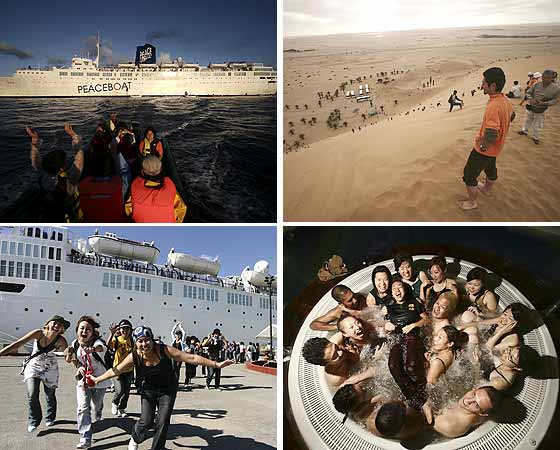
For over twenty years, idealistic Japanese with sea legs and some time on their hands (usually college students and retirees) have set a course for adventure, their minds on more than a new romance (though that happens sometimes, too)—aboard the Peace Boat. The ship formerly known as the Carnival Carnivale docks at Pier 92 at 50th Street this week. Founded in 1983 by a Japanese university student—she’s now a socialist legislator there—the Peace Boat’s original purpose was to give Japanese students firsthand experience with the victims of their country’s war crimes. Its itinerary is often more geopolitical than touristy: In 2002, after docking at Kunashir Island, occupied by Russia but claimed by Japan, the ship sparked a small international-relations crisis. It was resolved only when Russia allowed passengers to go ashore without visas. Another frequent port of call: North Korea.
The 1,000 or so peaceniks—almost all from Japan—pay about 1.28 million yen, which is about $11,000, for a three-month cruise. In addition to the seminars conducted by guest lecturers who hop on and off the ship, passengers organize their own culturally relevant activities: karate and taiko drumming, screenings of The Fog of War, journaling, ukulele playing, and occasional geography quizzes in the sports bar. There are about five lectures a day. Social interaction is also fueled by group dialogues such as “Let’s talk about soccer in Europe” (11:30 p.m. to midnight on the sports deck) and “Let’s call for dolphins by healing power” (1:50 to 2 p.m. at the stern). “It’s a cruise ship that has everything from hard-core education to partying,” says 25-year-old New York–based organizer Ryo Ijichi. The goal has always been to awaken “really normal typical youth of Japan” to be less parochial in their outlook. “For people who are more interested in the ‘boat’ part than the ‘peace’ part, once they’re onboard we can change them,” he says.
The Peace Boat promises something for everyone—including love, exciting and new. “There were lots of guys and girls, and sometimes we’d have a party and drink, and for some people, romance was born,” says Noriko Senaha, who worked as an onboard English interpreter. “When we got to Spanish-speaking countries in South America, [the English interpreters] would not have much to do, so we would just party all night and have fun.” Oh, and change the world, too. Already, plans are afoot to launch an American Peace Boat, on the assumption that our really normal typical youth could use the soft-sell on thinking globally, too. There will be a world-music concert at Dag Hammarskjöld Plaza on Tuesday to promote it. “We want to see how we can succeed in becoming an alternative business,” says Ijichi. “We want to become successful in the cruise industry as well as the peace industry.” Next: Wanna BuyRocky Aoki’sCandlesticks?